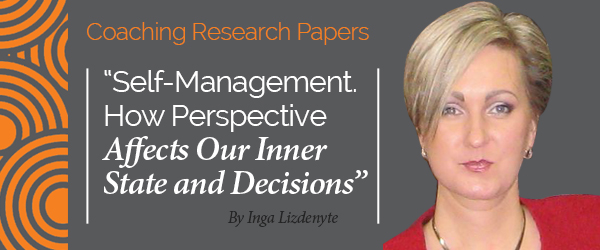Research Paper By Inga Lizdenyte
(Life Coaching, UNITED STATES)
One of my favorite classes was Self-Management. In my class the discussion was about the ways how coaches can manage themselves and maintain the empowering inner state. I believe one of the strongest assets that a coach or anybody can have is the ability to manage self. It is essential to manage self at all times, because our inner state greatly affects our decisions and actions. For a coach it is one of the most important traits, because in addition to his ability to handle his own challenges, he must be able to show up at the coaching session ready to help another person.
While being able to manage yourself, it is important to know how we can help our client to manage himself as well.
What is self-management? It is the ability to control your response to life’s events, manage your thoughts and feelings/emotions. Or, in other words it is the ability to control your inner state. It is critical for us to be able to manage our inner state at all times, because it determines decisions. Would you agree, that you make different decisions and choose different actions when you feel hopeful, strong and determined and when you feel helpless, disempowered and doubting?
Our inner state depends on our Thought focus and Perspective.
What causes excitement and depression? Both inner states are the result of our thought focus. Nobody gets into a depression by focusing on exciting opportunities, or how grateful he is for everything good that he has. Depression sneaks in when a person pays close attention to what he is not happy about and constantly thinks about it. Same way, the more a person will focus on positive events, new opportunities and compelling goals, there will be no room for sadness, but the excitement and desire to implement his desired change. Our feelings always follow our thought focus.
I learned and realized that thoughts and emotions don’t just “happen” to me, leaving me powerless against them. I choose what I think and what I focus on, what meaning I give to the events and what I am going to do about it. Nobody and no event have the power to make me feel in any particular way, unless I allow it. I am the one who chooses my response, and that depends on my perspective and my interpretation of what it means to me.
We always in our mind communicate to ourselves what things mean to us, how we feel about occurred events and what we are going to do about it all. When we are doing well, we are excited and think about how thrilled we are that things are going well, what it took for us to achieve success, and having even stronger belief of what is possible for us, we move on to another venture. Likewise, in the event of various complex circumstances, we weigh our current situation, ask ourselves why it happened, and make conclusions and decisions for the future. While we are thinking about one or the other situation, we feel certain emotions. It’s easy to see the good side and feel positive emotions when the circumstances are in our favor. But it’s more challenging to feel positive if it’s a painful and difficult event for us. The way we will feel about the event greatly depends on how we interpret it and how we communicate it to ourselves.
